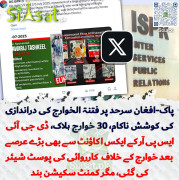Wadaich
Prime Minister (20k+ posts)
Isn't it an act of Treason--Govt losing rights over expensive E-Office software
Govt losing rights over expensive E-Office software
By Our Staff Reporter
Thursday, 19 Aug, 2010
Thursday, 19 Aug, 2010
ISLAMABAD, Aug 18: The federal government is losing its proprietary and intellectual rights over a multi-billion-rupee project for electronic office (E-Office) software and application to private vendors because of poor monitoring of project implementation, resulting in huge payments for automation of government departments and line ministries.
Informed sources told Dawn that under the E-Office at MOIT, the government decided to improve efficiency of federal government ministries and divisions through electronic management of office records and correspondence. Ultimately, more than 400,000 employees of the federal government and users in other government offices were to be linked with a central server.
The Electronic Government Division (EGD) executed the project under which e-office software was developed and being rolled out at the Ministry of Information Technology. As per terms and conditions stipulated in the contract agreement between vendor LMKR and the EGD, the developed software could be used within the ministry and its replication in 40 line ministries and then provincial governments and other government offices and departments.
The contract required that after successful conduction of acceptance test on software by the customer (MOIT), the software supplied pursuant to the contract will become the property of the customer. The contractor will be bound to provide the source code to customer for usage and modification for its own use and train the customer staff so that some modification can be done on customer side.
Being the property of the federal government, the software was then to be provided to provincial governments and government agencies free of cost by the government for improved working efficiency. However, the vendor started selling the software to government agencies independently and when some intelligence agencies wanted to get the software from the MOIT for security reasons instead of the private vendor, it suddenly came to light that the MOIT was unable to provide the facility because the vendor had not provided source code to the government in violation of the contract. The MOIT, however, put the issue under the carpet.
A fact finding report submitted to the federal government and the Senate Standing Committee on Information Technology said the solution proposed by LMKR was Lotus Notes base, which was later changed to front side java. The report said the justification was not available in the official files for changing technology from Lotus to Java.
The report said the E-office application was developed by the MOIT and if the intellectual property is to be lie with the government of Pakistan, then there was no need to accept bid for granting permission to the vendor to sell user licences of E-Office application. The report pointed out that the application was legally the property of the government of Pakistan, hence, there was no justification for the GOP departments and agencies to pay for the licence for each user by allowing the vendor to use its own intellectual property.
The project was required to be replicated in all ministries and divisions. As per requirement of replication, the EGD had signed the contract with LMKR to create and configure the use licenses for 4500 users of ministries and divisions on centralised server and then proprietary rights of source code would stand transferred to the EGD.
The relevant clause of the contract said upon the issuance of final acceptance certificate by the vendee to the vendor, the vendee shall have the complete and exclusive ownership (including all rights, title and interest, whether copyright or any other, as applicable) of each component of the project including such items as are designed, developed, made, or created by the vendor specifically for the vendee pursuant of this agreement including any written deliverables, etc.
The ownership of all the product including source code in case of bespoke solution and services rendered under any contract arising as a result of this RFQ (request for qualification) will be the property of the MOIT, government of Pakistan. However, it emerged that the private vendor had already sold the application to a number of government agencies including Competition Commission of Pakistan, AJK, Khyber Pakhtunkhwa, some telecom companies, Capital Development Authority (CDA) and even some defence agencies.
Informed sources said the tendering parameters were also changed to benefit the private vendor and certain clauses of the Pakistan Public Procurement Authority (PPRA) had also been violated by the MOIT in implementation of the project. In the meanwhile, the MOIT did not develop a data centre to take care of the E-government initiative. The employees who pointed out these changes and contract violations were being forced out, these sources said.
The Senate Standing Committee on Information Technology is expected to take up the project for probe when it meets on Thursday, the sources said.
http://www.dawn.com/wps/wcm/connect...ng-rights-over-expensive-eoffice-software-980
Informed sources told Dawn that under the E-Office at MOIT, the government decided to improve efficiency of federal government ministries and divisions through electronic management of office records and correspondence. Ultimately, more than 400,000 employees of the federal government and users in other government offices were to be linked with a central server.
The Electronic Government Division (EGD) executed the project under which e-office software was developed and being rolled out at the Ministry of Information Technology. As per terms and conditions stipulated in the contract agreement between vendor LMKR and the EGD, the developed software could be used within the ministry and its replication in 40 line ministries and then provincial governments and other government offices and departments.
The contract required that after successful conduction of acceptance test on software by the customer (MOIT), the software supplied pursuant to the contract will become the property of the customer. The contractor will be bound to provide the source code to customer for usage and modification for its own use and train the customer staff so that some modification can be done on customer side.
Being the property of the federal government, the software was then to be provided to provincial governments and government agencies free of cost by the government for improved working efficiency. However, the vendor started selling the software to government agencies independently and when some intelligence agencies wanted to get the software from the MOIT for security reasons instead of the private vendor, it suddenly came to light that the MOIT was unable to provide the facility because the vendor had not provided source code to the government in violation of the contract. The MOIT, however, put the issue under the carpet.
A fact finding report submitted to the federal government and the Senate Standing Committee on Information Technology said the solution proposed by LMKR was Lotus Notes base, which was later changed to front side java. The report said the justification was not available in the official files for changing technology from Lotus to Java.
The report said the E-office application was developed by the MOIT and if the intellectual property is to be lie with the government of Pakistan, then there was no need to accept bid for granting permission to the vendor to sell user licences of E-Office application. The report pointed out that the application was legally the property of the government of Pakistan, hence, there was no justification for the GOP departments and agencies to pay for the licence for each user by allowing the vendor to use its own intellectual property.
The project was required to be replicated in all ministries and divisions. As per requirement of replication, the EGD had signed the contract with LMKR to create and configure the use licenses for 4500 users of ministries and divisions on centralised server and then proprietary rights of source code would stand transferred to the EGD.
The relevant clause of the contract said upon the issuance of final acceptance certificate by the vendee to the vendor, the vendee shall have the complete and exclusive ownership (including all rights, title and interest, whether copyright or any other, as applicable) of each component of the project including such items as are designed, developed, made, or created by the vendor specifically for the vendee pursuant of this agreement including any written deliverables, etc.
The ownership of all the product including source code in case of bespoke solution and services rendered under any contract arising as a result of this RFQ (request for qualification) will be the property of the MOIT, government of Pakistan. However, it emerged that the private vendor had already sold the application to a number of government agencies including Competition Commission of Pakistan, AJK, Khyber Pakhtunkhwa, some telecom companies, Capital Development Authority (CDA) and even some defence agencies.
Informed sources said the tendering parameters were also changed to benefit the private vendor and certain clauses of the Pakistan Public Procurement Authority (PPRA) had also been violated by the MOIT in implementation of the project. In the meanwhile, the MOIT did not develop a data centre to take care of the E-government initiative. The employees who pointed out these changes and contract violations were being forced out, these sources said.
The Senate Standing Committee on Information Technology is expected to take up the project for probe when it meets on Thursday, the sources said.
http://www.dawn.com/wps/wcm/connect...ng-rights-over-expensive-eoffice-software-980
Last edited:


































